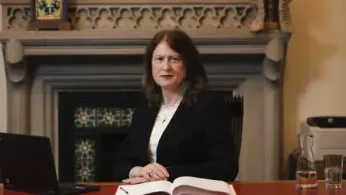
Aug 19
UK’s First Transgender Judge Appeals Supreme Court “Biological Sex” Ruling to European Court of Human Rights
READ TIME: 3 MIN.
In April 2025, the UK Supreme Court issued a landmark ruling clarifying that, under the 2010 Equality Act, “sex” refers strictly to “biological sex” rather than gender identity. The case arose from litigation brought by For Women Scotland, which challenged the Scottish Government's efforts to expand legal protections for transgender women with Gender Recognition Certificates (GRCs) in single-sex spaces such as schools and prisons. The Supreme Court sided with those arguing that the law’s intent was to uphold single-sex spaces based on birth sex, not legal gender recognition documents .
This ruling has significant practical and symbolic impacts. It effectively means that trans women—and trans men—may be excluded by default from single-sex spaces that do not align with their gender identity, even if they hold a GRC. Previously, under the Equality Act, trans people could only be excluded from such spaces if there was a “legitimate aim” for doing so .
Victoria McCloud, who served as the UK’s first openly transgender judge until stepping down in 2024, sought permission to intervene in the Supreme Court proceedings. She argued that the legal change would have profound consequences for trans women with GRCs, including herself. Her application to present evidence was rejected; the Supreme Court stated it was focused on statutory interpretation and did not typically hear personal testimony or interventions from individuals .
Following the ruling, McCloud described the climate as “a scary time” for trans people in the UK and voiced concerns about the exclusion of trans perspectives in a decision that directly impacts their lives. “If I was a trans person in the UK today, I would steer clear of using any loo in a public space unless it was a single-sex or combined-sex loo, because I personally cannot, as of this moment, judge whether I should use the male loo or the female loo,” McCloud told the press .
On August 18, 2025, Victoria McCloud, supported by a coalition of transgender lawyers, filed a formal application with the European Court of Human Rights (ECHR) in Strasbourg. The challenge contends that the Supreme Court’s refusal to hear from transgender individuals, and the resulting interpretation of the law, breaches Article 6 (right to a fair trial) and Article 8 (right to respect for private and family life) of the European Convention on Human Rights. The legal team argues that decisions about the rights and dignity of transgender people should not be made without their participation .
Olivia Campbell-Cavendish, a prominent trans lawyer involved in the case, emphasized: “The impact on trans people is horrendous, but actually this affects all of us. We need a society where decisions about us aren’t made without us. We need a society that is fair and equitable, and so that's why we are doing what we are doing” .
The ruling and subsequent appeal have intensified the national conversation about LGBTQ+ rights in the UK. Many LGBTQ+ organizations, legal scholars, and human rights advocates have criticized the Supreme Court’s reliance on arguments from “gender critical” activists, which they argue revives outdated and exclusionary notions of biological essentialism. Critics warn that the decision not only undermines the dignity and safety of trans people but also risks rolling back broader gender equality progress by using “biology” as a gatekeeping tool—a tactic historically used to restrict the rights of cisgender women as well .
Supporters of the ruling, including groups like For Women Scotland, maintain that the Supreme Court’s primary concern is the clear interpretation of statutory language rather than individual testimonies or broader social impact. They assert that the ruling simply clarifies existing law rather than targeting transgender individuals .
Legal experts note that the ECHR’s decision to hear the case or not could have far-reaching consequences, not just for the UK but for the interpretation of human rights protections for LGBTQ+ people across Europe. The outcome may determine whether transgender people must be directly consulted in legal processes that affect their fundamental rights .
As the case proceeds, it will be closely watched by advocates, policymakers, and LGBTQ+ communities in the UK and beyond, as it poses fundamental questions about who gets to participate in decisions about equality and human dignity .






